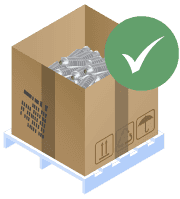Converter Sourcing
Catalytic Converter Legislation: Staying Updated on Converter Regulations

The rise in catalytic converter theft was accompanied by a surge in converter legislation and regulations. Elected officials in some local and state governments drafted stringent converter laws to discourage thieves, but the sad reality is, legitimate converter recyclers feel discouraged too.
To continue buying and selling converters, these new laws ask that you provide certain legal documents – permits, business registration, proof of vehicle ownership, and more. The evolving converter regulations may seem complicated, so we understand your concerns about operational risks resulting from issues with paperwork.
But with the right guidance, you won’t have to stop your converter operations. You’ll stay well-informed about relevant legislation in your area, so that you can provide the necessary documents and keep doing business with confidence. So if you’re ready to get informed, keep reading!
Why Are Converters Valuable?
Catalytic converters are valuable because of the precious metals they contain. Platinum, palladium, and rhodium act as a catalyst that transforms harmful pollutants into less damaging emissions. Once converters are scrapped and enter the recycling stream, the metals are extracted and sold on the open market.
Why is Recycling Converters So Important?
The US Department of the Interior considers platinum group metals critical minerals, sustaining hundreds of vital industries such as medical equipment manufacturing, pharmaceuticals, and hydrogen fuel cells.
As of 2021, recycled catalytic converters represented 23% of the global supply of PGMs. That means that when we recycle converters, we’re not only contributing to the sustainability of these crucial industries but also reducing our dependence on mining and preserving our environment for future generations.
It's for these reasons that catalytic converters are essential for many scrap metal and automotive recyclers – and why thieves covet them.
What Are Your Elected Officials Doing About Converter Theft & How You Can Stay Informed about Converter Legislation
Keeping up with local, state, and national laws regulating converter transactions is easy when you know where to look. A quick internet search using keywords such as “catalytic converter”, “laws”, and “bills” will generate the latest news on the subject and what your elected officials are doing about it.
But for added guidance, we’ll help you identify official websites to bookmark, ensuring you’re following all regulatory guidelines and staying well-informed.
Local Websites
You can visit your city’s official website and search the municipal code. For example, the city of Los Angeles passed a bill on June 5th on the prohibition of illegal possession of converters. Recyclers in Los Angeles should be visiting the city’s website to stay well informed about changes to the municipal code.
We suggest adding your city’s official website to your favorites, if possible, and visiting the municipal code regularly. This way, you’ll remain informed of any changes in the law.
State Websites
To track state bills and acts affecting the converter recycling industry, visit Bill Track 50 or the National Insurance Crime Bureau’s web page. These platforms show current session bills, allowing you to browse through bills that are in committee, declined, or enacted. Once you select the bill and state of your choice, you’ll be redirected to the official state website, enabling you to access the details of the bill.
National Websites
For Americans, visit the congress.gov website’s advanced search tool. Type “catalytic converter” under the Words and Phrases tool to discover the bills that regulate converter trade. If you’re not in the United States, simply visit the official website of your country’s government and search for any bills regulating converter trade.
With internet searches and official websites covered, let’s move on to what you can do to ensure you’re following the law.
Having the Right Documentation
To buy and sell catalytic converters legally, many states require documentation. Be sure to check your official websites to make sure you’re requesting and providing the right paperwork.
Here's a few documents to start:
- Photo ID and vehicle identification numbers (VINs)
- Verify your seller’s business registration and make sure yours is up-to-date
- Recycling licenses and permits demanded by local and state law
If you’re buying converters on-site, here’s how to spot stolen units and keep them out of your facility:
- Converters that appear brand-new and shiny
- No proof of vehicle ownership
- Cash-only transactions with no other payment alternatives
- Sellers who only own converters and lack dismantling connections
- Sellers who accept any offer without negotiation
Ensuring Consistent Revenue
We understand that skyrocketing thefts of catalytic converters is concerning. But converters remain a profitable revenue stream and add value to your wider recycling ventures. Don’t let changing converter legislation discourage you from doing business confidently.
Take the right steps and stay informed about catalytic converter laws and regulations. This way, you’ll have the right documentation, make the right choices, and continue doing business confidently.
For more information, visit PMR’s Responsible Sourcing guidelines or call one of our Representatives.

